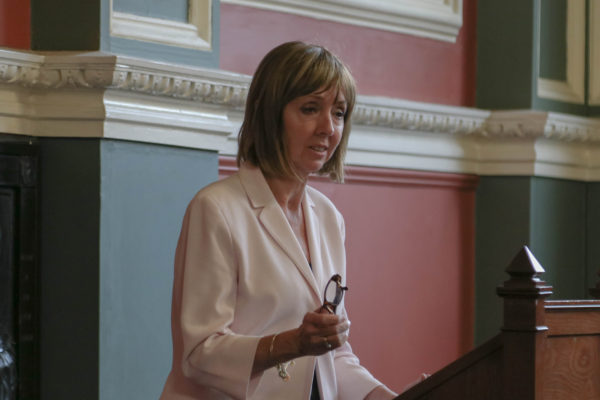
Trinity Politics Society (Pol Soc) welcomed presidential candidate Senator Joan Freeman into the Graduates Memorial Building (GMB) on Friday evening to discuss her ongoing campaign. As the renowned psychologist and mental health activist took to the podium, she dramatically discarded her prepared speech before launching into a passionate discussion about her plans for the presidency.
The founder of Pieta House and the popular Darkness Into Light run, Freeman is known most widely for her pioneering work as a mental health activist. Her recent philanthropic work, Freeman explained, is all rooted in her career as a psychologist. The charismatic candidate painted a picture of an Ireland, just fifteen years ago, in which mental health issues were swept under the rug, in which an obstinate taboo blocked the opening of a discussion concerning self-harm and suicide. Freeman herself admitted to submitting to this cultural discomfort with mental health, invariably sending self-harming patients to the local GP rather than intervening herself.
“Everything changed”, declared Freeman, when she lost a loved one to suicide and became personally exposed to the horrors of the hush-hush attitude to mental health in Ireland. Thus began years of research, determination and generosity that would culminate in the founding of Pieta House. What started as a one-woman show now boasts 280 staff members and 15 locations. This, according to Freeman, “proves that when we come together to tackle an issue, we can make a difference”.
As president, the psychologist asserted, she hopes to tap into this power we wield as communities, and as a nation, to effect change where we want to see it. Indeed, central to her campaign is her commitment to empowering the people of Ireland, driven by her determination to focus on the social issues deeply ingrained in Irish society. Most notably, Freeman spoke of the homelessness crisis and her responsibility as potential president to prioritise the wellbeing of the population. “We need to build up the resilience of our people”, Freeman stated.
Also influencing her campaign seems to be Freeman’s role as a mother and her previous work with children and teenagers. Freeman explained that as president, she would like to nurture children, invest in their development, and to generally amplify the voices of younger generations. Freeman recognised the dire need in politics to “not only listen to young people but to take on their advice”. So passionate is Freeman about centring the younger generation’s voice that she made a pledge to place a young adult on the Council of State “to inform us on the problems facing young people, and to suggest the most suitable solutions”. Freeman especially emphasised this point in terms of tackling issues such as cyberbullying, which she identified as a relatively recent phenomenon and one her generation never had to deal with. Indeed, Freeman’s appeal to the younger demographic was refreshing, marked by its sincerity and her readiness to recognise the reality of a significant generation gap.
When questions were opened up to the floor Freeman was immediately quizzed on her political leanings having been labelled a social conservative due to her strong relations with the Church, and more specifically, her no vote in the abortion referendum last May. Freeman stressed that whatever her political convictions, that they would not impact her candidacy. She pointed out that her two daughters were activists for the yes campaign and for her, what was most important about the referendum was “being able to accept a person’s decision”. It seemed an attempt to avoid any detailed analysis of her political positions.
Moving into more comfortable territory, Freeman was asked about her role as a mental health advocate and how she might use the presidential platform to further the initiative. “The president is someone who can start and lead the conversation”, she explained. Freeman detailed the scope of influence that the president has, and her plans to bolster the development of the conversation surrounding mental health, to continue breaking down the taboo and overturning the outdated pact of silence in Ireland.
Freeman’s trailblazing work with Pieta House has quite rightly gained her a reputation as a voice of the voiceless and as an influential philanthropist. Eager to carry this experience into Áras an Uachtaráin, the senator’s intuitiveness and authenticity is certainly a distinguishing feature of her campaign but considering recent polling, seems unlikely to carry her over the line. Nevertheless, her campaign itself has further publicised an important conversation about wellbeing and social anxieties.






